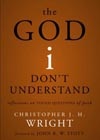Skill Builders
Article
What About the Canaanites?
Editor's note: What follows is a brief excerpt from Christopher Wright's book The God I Don't Understand (Zondervan). One of the book's main questions is "What about the Canaanites?" Why does God command Israel to exterminate the people living in the Promised Land? Part of the answer Wright offers is to show that this command was the exception to a far different attitude toward the alien reflected in Old Testament law. To read the PreachingToday.com interview with Wright about his book, click here.
Care for Foreigners in Old Testament Law
A major counterbalance to the destruction of the Canaanites in the conquest narrative is the strength of practical concern for foreigners that is enshrined in Old Testament law. Many foreigners (whether former Canaanite population or immigrants) assimilated and became "resident aliens." But generally foreigners were vulnerable, because they lacked the natural protections of family and land. There was a strongly positive concern for their well-being and protection.
What did the Old Testament law have to offer such foreigners? A great deal. If you take time to read through the texts below, I think you will be impressed with an ethos that strongly modifies what we might think if we only read the conquest narratives. The Old Testament speaks of protection from general oppression (Ex. 22:21; Lev. 19:33) and from unfair treatment in court (Ex. 23:9; Deut. 10:17–19; 24:17–18); inclusion in Sabbath rest (Ex. 20:9–11; 23:12; Deut. 5:12–15) and inclusion in worship and covenant ceremonies of Passover (Ex. 12:45–49), the annual festivals (Deut. 16), the Day of Atonement (Lev. 16:29), and covenant renewal ceremonies (Deut. 29:10–13; 31:12); the economic benefit of the triennial tithes (Deut. 14:28–29; 26:12–13) and access to agricultural produce (gleaning rights) (Lev. 19:9–10; Deut. 24:19–22); and equality before the law with native-born (Lev. 19:34).
Binding all such practical legislation together is the simple command, given twice: love the foreigner. In Deuteronomy, this command is based on the example of God himself. Yahweh is characterized by his practical love for the needy foreigner—a character trait that Israel knew well from their exodus experience:
He defends the cause of the fatherless and the widow, and loves the foreigners residing among you, giving them food and clothing. And you are to love those who are foreigners, for you yourselves were foreigners in Egypt.
In Leviticus, the same command mirrors the earlier command in the same chapter to "love your neighbor as yourself" (Lev. 19:18).
The foreigners residing among you must be treated as your native-born. Love them as yourself, for you were foreigners in Egypt. I am the Lord your God.
So there is a powerful pulse of legislative energy in Israel's law that is positively favorable and protective toward foreigners in their midst. Now of course this does not remove or even reduce the violence that we find in the narrative of the conquest. But it does show a counterbalancing force within the legal custom of Israel. And that in turn shows that the conquest was seen as a limited historical necessity, not as an ongoing paradigm for social attitudes or behavior within Israel toward foreigners in general. When Paul told Christians to "practice the love of strangers," he was drawing on strong scriptural roots.* Hebrews 13:1–2 has a similar exhortation, with clear Old Testament allusion as precedent. There philoxenia is put right alongside philadelphia (love for brother/sister).
*The traditional translation of Romans 12:13, "practice hospitality," is too weak for the word Paul chose—philoxenia, which literally means "love of the stranger, the outsider." It is the diametric opposite of xenophobia.
Used by permission. © Christopher J. H. Wright, 2008. From The God I Don't Understand (Grand Rapids: Zondervan, 2008)
Christopher J. H. Wright is international director of the Langham Partnership International. He also serves as chair of the Lausanne Committee's Theology Working Group, and chair of the Theological Resource Panel of TEAR Fund. He is author of several books, including The Mission of God (IVP Academic, 2006).










